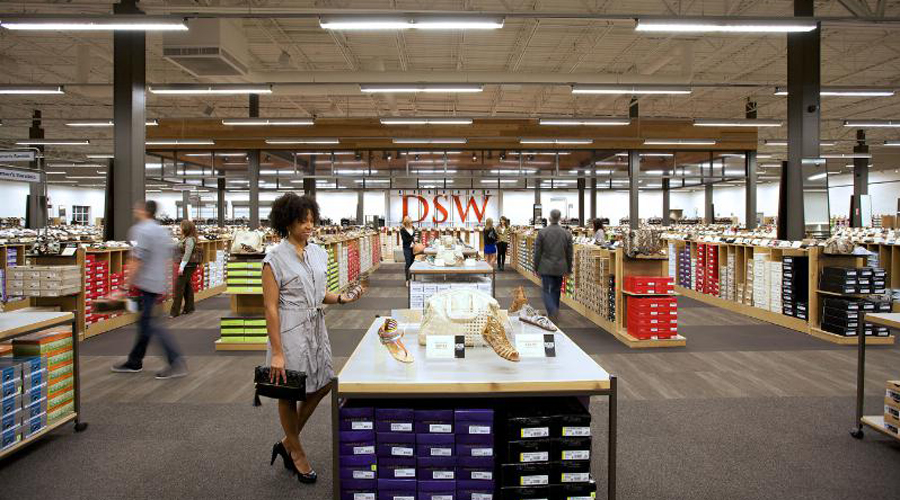Boosted by robust seasonal, athleisure and kids sales, DSW Inc. reported second-quarter results that came in well-above expectations and hiked guidance for the year. The launch of VIP rewards, along with digital marketing investments in particular, drove traffic to both DSW’s warehouses and website.
The company also announced plans to exit the company’s small Town Shoes business to focus on the company’s core off-price business.
As part of the revised outlook, DSW now expects:
- Revenues to increase in the range of 6 percent to 9 percent, up from previous expectations calling for a decrease in the 1 to 3 percent range.
- Comps to expand in the low- to mid-single digit range, up from the low-single digit range previously;
- Earnings in the range of $1.60 to $1.75, up from 1.52 to $1.67 previously.
In the quarter ended August 4, revenue increased 16.4 percent to $795 million, exceeding Wall Street’s consensus estimate was $689.4 million.
Comparable sales increased 9.7 percent in the latest quarter.
On a conference call with analysts, Roger Rawlins, CEO, said, “As we laid out our strategy for 2018, we decided to return playing offense by investing in talent, inventory and marketing. The incredible results this quarter, the best comp we’ve had since 2011, demonstrate the power of playing to our strengths.”
He noted that the retailer delivered the company’s best quarterly comp since 2011.
“From a merchandising perspective, we distorted inventories at sandals, athleisure and kids footwear, which drove a significant portion of our sales increase,” said Rawlins. “Every category in the U.S. Retail segment, women, men’s, athletic and accessories, had positive comps in Q2. We are committed to fueling this incredible momentum going forward with the right investments and, consequently, we’ve raised our sales and earnings outlook for 2018.”
He further noted that the company consolidated Canadian acquisition for the first time this quarter. He said, “We’ve chosen to exit our smallest Canadian banner in order to focus on the businesses that can best leverage our core competencies and provide us a strong foundation to grow our business in North America.”
The company will exit the company’s full price, mall-based Town Shoes banner, which operates 38 locations, mostly by the end of the fiscal year. DSW will focus on the company’s largest retail banners, Shoe Company, Shoe Warehouse and DSW Designer Shoe Warehouse.
The loss in the period came to $38.4 million, or 48 cents a share, against earnings of $28.7 million, or 36 cents, the prior year. The loss in the latest year largely reflects pre-tax charges totaling $98.4 million, or $1.20 per share, primarily related to the acquisition of the Canadian retail business and the exit of Ebuys. The year-ago period also included some charges related to restructuring activities, accounting accruals and foreign currency adjustments.
Adjusted net income came to $50.9 million, or 63 cents a share, versus $30.7 million, or 38 cents, a year ago, a jump of 65.7 percent. Analysts’ consensus target had been 46 cents.
Reported gross margins increased 280 basis points to 32.1 percent due to favorable merchandise margin and occupancy leverage.
Gross margins in the company’s U.S. segment improved to 33.2 percent from 30.9 percent. Merchandise margins improved to 45.9 percent from 44.4 percent while store occupancy expenses were reduced to 10.6 from 11.4 percent.
Reported operating expenses, as a percent of sales, increased by 220 basis points, driven by marketing investments, acquisition-related costs and restructuring expenses.
Jared Poff, CFO, said sales at the company’s largest business, Designers Shoe Warehouse, increased by 10 percent. All categories posted positive comp growth for the first time since the first quarter of 2015. The VIP program launch and digital marketing investments drove traffic with an increase in average spend per customer and new customer activity.
“Our better in-stock position drew a higher mix of regular priced sales and better margins, while our open-to-buy liquidity enabled us to aggressively chase this upside,” said Poff. “Our omni-channel investments paid off as our cross-channel strategy resulted in some of the strongest digital growth rates in the industry and a double-digit increase in transaction activity driven by all channel.”
Among categories, footwear exceeded expectations with a 10 percent comp increase, the fifth quarter in a row of positive comp. Seasonal footwear such as sandals saw a “healthy” double-digit comp gain.
“While consumer appetite for the athletic lifestyle remained healthy, demand for non-athletic footwear improved across dress, casual and seasonal offering. New styles and fashion sport are energizing the athleisure category, and we are excited with the new opportunities to grow our core athletic offering over time,” said Poff.
Men’s footwear, including athletic, turned positive in the quarter with benefit of the introduction of “fresh takes on dress and casual comfort.”
The accessories category rebounded and delivered a positive comp this quarter amid efforts to introduce new complementary product lines; aligned good, better, best assortments and expanded the digital presence online. The retailer completed the fourth and last phase of the company’s kids’ rollout this quarter with 94 new locations.
Said Poff, “The kids business makes us more competitive during the important back-to-school season, which has traditionally been a valley in our sales curve. We have lined up our buys to support this business, as it gains more traction from a national marketing campaign and increasing customer awareness. Part of the labor investment we’ve made this quarter includes dedicated fit associates who are trained to specifically serve the needs of young families.”
Discussing some key initiatives, Rawlins said the company benefited from aggressive buys in seasonal, athleisure and kids, with those three categories accounting for 85 percent of the company’s sales increase year over year. Said Rawlins, “Our focus on increasing key items across all categories is driving better in-stock, better conversion and stronger regular priced selling.”
DSW is also continuing to elevate the company’s mix through exclusive or owned brand, which delivers “far superior margins” and has the potential to achieve a significantly higher penetration.
“Technology has made it easier for brands to develop a direct-to-consumer model, and more than ever, it is critical we develop strong design and sourcing capability either through continuing to build-in internally or through an acquisition that can take our exclusive brands to the next level,” said Rawlins. “In doing so, we will drive more margin dollars and better margin rates for DSW Inc.; give us more leverage with vendors, who will have to compete for space in our warehouses against our DSW exclusive or owned brand; acquire additional expertise in footwear manufacturing that enables us to make better sourcing decision and potentially diversify our revenue stream through new channels of distribution then enable us to become increasingly involved in a greater number of customer purchase decision. Owning these capabilities will enable us to differentiate our competitive offering while opening up new market opportunities long-term for our exclusive or owned brand.”
In marketing, Rawlins noted that substantially increased digital investments are driving growth in new customer transactions, average spend per member, rewards redemption and member activation rate. Said Rawlins, “Customer response to new perks such as our new shoe donation program has been strong. We are on track to donate close to half a million pairs of shoes this year, demonstrating our ability to drive an emotional connection with our customers.”
Operationally, he noted that DSW rolled out a new system that lets the selling team focused on customer engagement while the warehouse team focuses on orders and inventory management. Said Rawlins, “It improves sales coverage and better aligns payroll hours to traffic pattern. Over time, we expect this new model to drive conversion and customer satisfaction.”
Among the ancillary services DSW is testing, Rawlins said the first Nail Bar is delivering solid results, and a second location is being opened. Shoe and handbag repair continues to perform well in the hometown Columbus market, and the repair offering will be expanded to the company’s New York Metro market in Q3.
Photo courtesy DSW
















